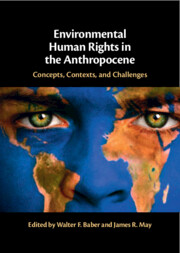Book contents
- Environmental Human Rights in the Anthropocene
- Environmental Human Rights in the Anthropocene
- Copyright page
- Contents
- Contributors
- Acknowledgements
- Introduction
- 1 Framing Environmental Human Rights in the Anthropocene
- 2 Protecting Environmental Human Rights for Future Generations
- 3 Taking Environmental Rights in the Anthropocene Seriously
- 4 The Quest for International Recognition of Environmental Human Rights
- 5 Socioeconomic and Cultural Rights and the Anthropocene
- 6 Local Governments, Climate Action, and Sustainability
- 7 Advancing Environmental Rights through Indigenous Rights
- 8 The Obligation to Curb Carbon Emissions
- 9 Human Rights in the Anthropocene, the Sustainable Development Goals and the Significance of SDG 17, “Partnerships for the Goals”
- 10 The Shape of Environmental Rights Opportunity Structures for the Anthropocene
- Conclusion
- Index
- References
7 - Advancing Environmental Rights through Indigenous Rights
Published online by Cambridge University Press: 02 March 2023
- Environmental Human Rights in the Anthropocene
- Environmental Human Rights in the Anthropocene
- Copyright page
- Contents
- Contributors
- Acknowledgements
- Introduction
- 1 Framing Environmental Human Rights in the Anthropocene
- 2 Protecting Environmental Human Rights for Future Generations
- 3 Taking Environmental Rights in the Anthropocene Seriously
- 4 The Quest for International Recognition of Environmental Human Rights
- 5 Socioeconomic and Cultural Rights and the Anthropocene
- 6 Local Governments, Climate Action, and Sustainability
- 7 Advancing Environmental Rights through Indigenous Rights
- 8 The Obligation to Curb Carbon Emissions
- 9 Human Rights in the Anthropocene, the Sustainable Development Goals and the Significance of SDG 17, “Partnerships for the Goals”
- 10 The Shape of Environmental Rights Opportunity Structures for the Anthropocene
- Conclusion
- Index
- References
Summary
Indigenous rights in Canada have developed as legal opportunity structures over the last six decades, achieving specific milestones such as improved access to courts, litigation cost rules (assisting Indigenous rights holders) and increased “legal stock” of case precedents Formatting– (Baber & Bartlett, 2019). Indigenous rights are intertwined with considerations of Mother Earth and the environment, but more importantly Indigenous sovereignty and political opportunity. Advancing Indigenous rights symbiotically advances alternative framings of rights of the environment, exposes historic and current power structures, and offers opportunities for complementary environmental and Indigenous goals. The United Nations Declaration of the Rights of Indigenous Peoples (UNDRIP) and its implementation in Canada is increasing symbiotically environmental rights opportunity structures. However, more can be done.
- Type
- Chapter
- Information
- Environmental Human Rights in the AnthropoceneConcepts, Contexts, and Challenges, pp. 132 - 148Publisher: Cambridge University PressPrint publication year: 2023



